|
|
|
Sort Order |
|
|
|
Items / Page
|
|
|
|
|
|
|
| Srl | Item |
| 1 |
ID:
111302
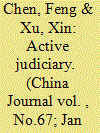

|
|
|
| 2 |
ID:
178712
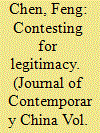

|
|
|
|
|
| Summary/Abstract |
‘Worker Representation’ (WR) originated as a spontaneous practice backed by workers’ collective actions in response to the failed role of trade unions. It allows workers to bargain with employers in a somewhat organized manner, thus facilitating the possibility of voluntary negotiations for dispute settlement. WR activists have sought to regularize the practice and establish its legitimacy in pragmatic, normative and cognitive terms. Yet WR poses a dilemma to the government, as it brings two divergent outcomes: it provides solutions to labor disputes and it inspires labor activism. As a result of its dual institutional logic of dispute resolution and stability maintenance, the government’s response to WR has oscillated between accommodation and suppression.
|
|
|
|
|
|
|
|
|
|
|
|
|
|
|
|
| 3 |
ID:
145887
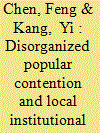

|
|
|
|
|
| Summary/Abstract |
Concurring with the approach stressing the role of contentious politics in (re)shaping state institutions, this study explores how disorganized popular contentions configure local institutional building in China. As Chinese citizens are not legally allowed to take organized collective action to express their grievances and demands, popular contentions, despite their common origins, similar claims and identical targets, break out here and there in large numbers without clear organizational shape. This compels the government to build institutions able to map scattered conflicts, detect potential problems and defuse them on a case-by-case basis in a timely fashion. Such a dissipative approach is distinguished, by its purpose, format and mechanism, from two common types of state responses to popular contentions—incorporation and repression—which are typically linked to democracies and authoritarian developing states where popular contentions are often organized in various ways.
|
|
|
|
|
|
|
|
|
|
|
|
|
|
|
|
| 4 |
ID:
180853
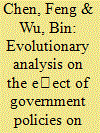

|
|
|
|
|
| Summary/Abstract |
Many countries have implemented incentive policies to support green R & D. However, the behavior of enterprises using the information asymmetry between government and enterprises to camouflage green R & D and obtain preferential policies will lead to the failure of policies. In order to explore the effectiveness of policies in stimulating green R & D, this paper studies the diffusion of green R & D in the photovoltaic industry under different scenarios of incentives and supervision. The results show that: (1) improving regulatory capacity or punishment can inhibit the behavior of enterprises camouflage as green R & D. (2) Under current policies, R & D tax incentives increasing has no obvious effect on the diffusion of green R & D. (3) When implementing the green R & D quota system (GRDQS), the diffusion of green R & D can be deduced under model, even if the R & D tax preference is cancelled. Based on our model, we believe that the GRDQS is an effective means to encourage the photovoltaic industry to carry out green R & D.
|
|
|
|
|
|
|
|
|
|
|
|
|
|
|
|
| 5 |
ID:
120961


|
|
|
|
|
| Publication |
2013.
|
| Summary/Abstract |
Labor conflicts in China can be classified into three types: those over legal rights, over interests, and over the pre-reform entitlements. They have relatively distinguishable bases, claims, framing, and patterns of interaction with the government. The typological classification is useful for understanding the developmental trajectory of labor conflict in China.
|
|
|
|
|
|
|
|
|
|
|
|
|
|
|
|
| 6 |
ID:
053774


|
|
|
| 7 |
ID:
139559
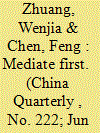

|
|
|
|
|
| Summary/Abstract |
The past few years have witnessed the revival of mediation as a chief method of labour dispute settlement in China. While the central government's campaign has reinvigorated the use of mediation in order to control social conflicts and maintain stability, its expansion and extensive deployment have also been driven by local authorities, as mediation can better serve their policy priorities and bureaucratic interests. Not only does the extension of mediation provide local bureaucratic agencies with flexibility and discretionary power to resolve conflicts without having to comply with legal minimums, it also legitimizes the courts' “non-legalistic approach” to settling dispute cases. The extensive employment of mediation by local authorities has chipped away at the role of legal procedures in settling labour disputes. The revival of mediation embodies a tension between the rule of law the government has promoted since the reform and the extrajudicial methods it needs for controlling conflicts.
|
|
|
|
|
|
|
|
|
|
|
|
|
|
|
|
| 8 |
ID:
153636
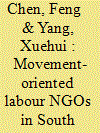

|
|
|
|
|
| Summary/Abstract |
Movement-oriented labour NGOs in China are groups committed to the advancement of workers’ collective interests in a way very similar to that of trade unions in other countries. As the gap between workers’ demands for collective bargaining and their lack of union representation widens, the role of movement-oriented labour NGOs has increased. These NGOs are led and driven by former workers who have a strong consciousness of workers’ rights and who fought in the workplace for their fellow workers’ interests as well as their own. The leadership shown by former workers significantly accounts for the behavioural patterns and strategic choices of movement-oriented labour NGOs. The study reported in this article uses two descriptive concepts to characterize the emergence and role of movement-oriented labour NGOs: exit with voice and displaced unionism. The former refers to the social process by which former workers become activists of movement-oriented labour NGOs, while the latter points to a grass-roots labour movement facilitated from outside the factory gates. This article argues that, while having performed a trade union-like role and promoted worker-led collective bargaining, movement-oriented labour NGOs embody a fundamental predicament of the Chinese labour movement, which is that organized labour activism in the Chinese workplace is largely prohibited.
|
|
|
|
|
|
|
|
|
|
|
|
|
|
|
|
| 9 |
ID:
071288


|
|
|
| 10 |
ID:
189504


|
|
|
|
|
| Summary/Abstract |
In 1968, at the height of the Chinese Cultural Revolution (CR hereafter), Mao Zedong mobilized industrial workers to form Workers’ Mao Zedong Thought Propaganda Teams (WPT hereafter) and to “occupy” the superstructure. This move empowered the working class in an unprecedented way. Did Mao's move bring about a new model of worker power under communism that was distinct from Lenin's vanguardist model and Rosa Luxemburg's model based on her perception of workers’ spontaneity and creativity? In contrast to the workers’ spontaneous rebel groups during the first two years of the CR, the WPTs were a quasi-institutionalized form of worker power created by the political elite to serve the CR agenda. It was also the Mao leadership's attempt to realize the leading role of the working class by absorbing workers into the structure of political authority, an attempt which reflected the Party's declared ideological principle. While the WPTs provided workers with opportunities to participate in politics, they were a misplacement of worker power in both social and organizational senses. The article examines the roots of this power misplacement and explores the dilemmas it brought for the Party as well as the working class itself, and why.
|
|
|
|
|
|
|
|
|
|
|
|
|
|
|
|
| 11 |
ID:
173259
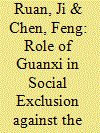

|
|
|
|
|
| Summary/Abstract |
This article is based on two case studies of social exclusion in two Chinese villages against the background of social stratification.Five types of social exclusion of the poor—housing, marriage, renqing, ritual, and gossip exclusion—are identified, which shrink the guanxi networks held by the poor. This in turn weakens their social and ritual capital and lowers their social status,leading to the reproduction of inequality. The research presented here finds that the vertical exclusiveness of guanxi, which is based on the concepts of in-group and out-group separation, superior and inferior separation, and symmetrical reciprocity, results in social exclusion of the poor. This process is underpinned by the instrumental use of the traditional Confucian ritual(li), in which ideas of modern social welfare, equality, and universalism are insufficient.
|
|
|
|
|
|
|
|
|
|
|
|
|
|
|
|
| 12 |
ID:
095312


|
|
|
|
|
| Publication |
2010.
|
| Summary/Abstract |
Although the Chinese government has claimed to be pursuing tripartism for labour relations, the non-judicial resolution of interest conflict in enterprises is largely a process of quadripartite interaction. In addition to the government and employers, the trade unions and workers are separate players: labour strikes in China are always launched by unorganized workers rather than by trade unions, whose task is to defuse the situation. Such a quadripartite process is dominated by the government, with the trade union playing a mediating role, not only between workers and the government but also between workers and employers. The process involves certain explicit and implicit rules, as well as distinct dynamics. This research examines the institutional and social basis of quadripartite interaction and how it led to the settlement of strikes. It demonstrates that although it can effectively defuse workers' collective action, a quadripartite process of conflict resolution reflects a low degree of institutionalization of industrial relations in China.
|
|
|
|
|
|
|
|
|
|
|
|
|
|
|
|
|
|
|
|
|